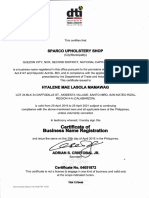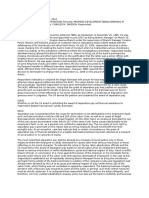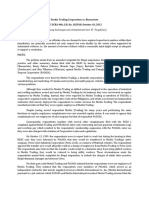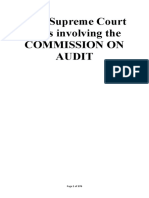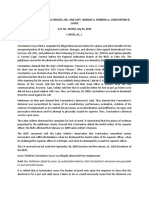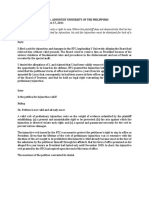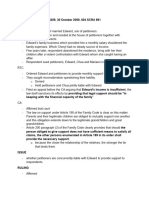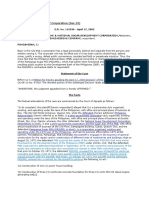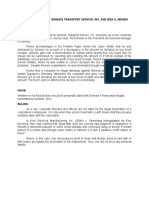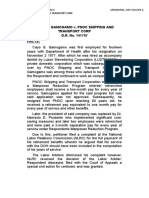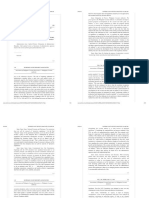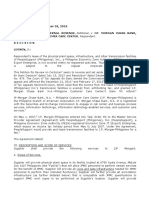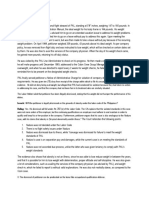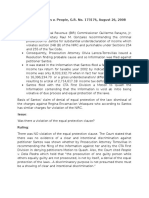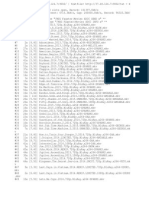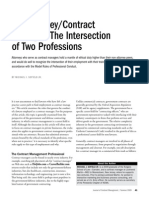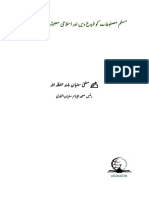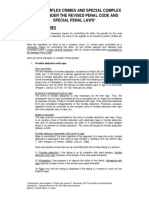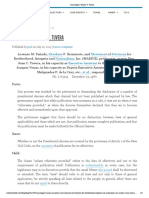4-11. Security Bank Savings Corp v. Singson (214230) PDF
4-11. Security Bank Savings Corp v. Singson (214230) PDF
Uploaded by
Kath LeenCopyright:
Available Formats
4-11. Security Bank Savings Corp v. Singson (214230) PDF
4-11. Security Bank Savings Corp v. Singson (214230) PDF
Uploaded by
Kath LeenOriginal Title
Copyright
Available Formats
Share this document
Did you find this document useful?
Is this content inappropriate?
Copyright:
Available Formats
4-11. Security Bank Savings Corp v. Singson (214230) PDF
4-11. Security Bank Savings Corp v. Singson (214230) PDF
Uploaded by
Kath LeenCopyright:
Available Formats
~ \
ll\epublic of tbe ~bilippines
~upreme
<!Court
FIRST DIVISION
- versus CHARLES M. SINGSON,
Respondent.
f(:..
1'.. :-~ ..tJ ....
.,.,fI .
~:... H~
, - 1(, ....
t.;
"9: ...- .
, 'i" 1r.1i*Jl' I.,-,, r \
;ffNanila
SECURITY BANK SAVINGS
CORPORATION
(formerly
PREMIERE
BANK)
DEVELOPMENT
M.
/HERMINIO
FAMATIGAN, JR.,
Petitioners,
. t ,.;.;t.! ((
:-.,rt.-.-~
~~~-
I.~ ... J'J1
I i \:,.Lo.:.--- - W..:...-l .... 11 . '
I: lj ,l
I1; \
I ,' \ ::
ArR
2
9
2016
\
' ;t
. i~ :~ .r!
!I \-\,..--I
<t:.~'!17 ~.,... ;7..~ : J l i
"7 ~_t;if. ~ f..;.,_ ~
:. "------~(t'.t::"~..,;:--- -
-~-- -10.1~..:I..----
G.R. No. 214230
Present:
SERENO, C.J., Chairperson,
LEONARDO-DE CASTRO,
BERSAMIN,
PERLAS-BERNABE, and
JARDELEZA, JJ.
Promulgated:
x------------------------------------------------------------------------ ----------------x
DECISION
PERLAS-BERNABE, J.:
2
Assailed in this petition for review on certiorari 1 is the Decision
dated May 21, 2014 of the Court of Appeals (CA) in CA-G.R. SP No.
121053, which affirmed the Decision3 dated April 25, 2011 and the
Resolution4 dated June 17, 2011 of the National Labor Relations
Commission (NLRC) in NLRC LAC Case No. 08-001972-10, sustaining the
award of separation pay by way of financial assistance to respondent Charles
M. Singson (respondent) despite having been dismissed for just cause.
The Facts
On November 25, 1985, respondent was initially employed by
petitioner Premiere Development Bank (now Security Bank Savings
Rollo, pp. 20-30.
Id. at 7-16. Penned by Associate Justice Edwin D. Sorongon with Associate Justices Rosmari D.
Carandang and Marlene Gonzales-Sison concurring.
Id. at 51-58. Penned by Commissioner Mercedes R. Posada-Lacap with Presiding Commissioner
Leonardo L. Leonida and Commissioner Dolores M. Peralta-Beley concurring.
Id. at 75-76.
Decision
G.R. No. 214230
Corporation [SBSC]) as messenger until his promotion as loans processor at
its Sangandaan Branch. Thereafter, he was appointed as Acting Branch
. Accountant and, in June 2007, as Acting Branch Manager. On March 26,
,, . 2008, he was
assigned to its Quezon Avenue Branch under the supervision of
J~ra.nch M~nag~r Corazon Pinero (Pinero) and held the position of Customer
: 'S~r~'i6e'
bperations
Head (CSOH)
tasked with the safekeeping of its
. ' ' '
'
,
' .,
5
~ -- checkbooks and other bank forms.
'
On July 22, 2008, respondent received a show-cause memorandum 6
from Ms. Ruby 0. Go, head of West Regional Operations, charging him of
violating the bank's Code of Conduct when he mishandled various
checkbooks under his custody. The matter was referred to SBSC's
Investigation Committee which discovered, among others, that as of July 11,
2008, forty-one (41) pre-encoded checkbooks of the Quezon Avenue Branch
7
were m1ssmg.
At the scheduled conference before the Investigating Committee,
respondent readily admitted having allowed the Branch Manager (i.e.,
Pinero) to bring out of the bank's premises the missing checkbooks and
other bank forms on the justification that the latter was a senior officer with
lengthy tenure and good reputation. He claimed that it was part of Pinero's
marketing strategy to procure more clients for the bank and that he did not
receive any consideration for consenting to such practice. He added that the
reported missing checkbooks had been returned by Pinero to his custody
after the inventory. 8
Pending investigation, respondent was transferred to SBSC's Pedro
Gil Branch. On September 30, 2008, he was again issued a memorandum9
directing him to explain his inaccurate reporting of some Returned Checks
and Other Cash Items (RCOCI) which amounted to P46,279.33. The said
uncovered amount was treated as an account receivable for his account. 10
A month thereafter, respondent was again transferred and reassigned
to another branch in Sampaloc, Manila. 11 Dismayed by his frequent transfer
to different branches, respondent tendered his resignation 12 on November 10,
2008, effective thirty (30) days from submission. However, SBSC rejected
the same in view of its decision to terminate his employment on November
11, 2008 on the ground of habitual neglect of duties. 13
9
10
11
12
13
Id. at 8 and 44.
NLRC records, p. 71.
Rollo, pp. 8-9 and 44-45. See also NLRC records, p. 73.
Rollo, pp. 9-10.
NLRC records, p. 72.
Rollo, p. 10.
Id. at 10.
NLRC records, p. 74.
Rollo, pp. 10 and 46.
Decision
G.R. No. 214230
Consequently, respondent instituted a complaint for illegal dismissal
with prayer for backwages, damages, and attorney's fees against SBSC and
its President, Herminio M. Famatigan, Jr. (petitioners), before the NLRC,
docketed as NLRC-NCR Case No. 10-14683-09. 14
For their part, 15 petitioners maintained that respondent was validly
dismissed for cause on the ground of gross negligence in the performance of
his duties when he repeatedly allowed Pinero to bring outside the bank
premises its pre-encoded checks and accountable forms in flagrant violation
of the bank's policies and procedures, and in failing to call Pinero's attention
on the matter which was tantamount to complicity and consent to the
commission of said irregularity. 16
The LA Ruling
In a Decision 17 dated July 26, 2010, the Labor Arbiter (LA) dismissed
the complaint and accordingly, declared respondent to have been terminated
from employment for a valid cause. The LA found that respondent not only
committed a violation of SBSC's Code of Conduct but also gross and
habitual neglect of duties when he repeatedly allowed Pinero to bring
outside the bank premises the checkbooks and bank forms despite
knowledge of the bank's prohibition on the matter. According to the LA, the
fact that SBSC suffered no actual loss or damage did not in any way affect
the validity of his termination. This notwithstanding, the LA awarded
respondent separation pay by way of financial assistance in the amount of
P218,500.00.
Aggrieved, petitioners appealed 18 to the NLRC, docketed as NLRC
NCR Case No. 10-14683-09, assailing the grant of financial assistance to
respondent despite a finding that he was validly dismissed.
The NLRC Ruling
In a Decision 19 dated April 25, 2011, the NLRC affirmed the LA
decision, ruling that the grant of separation pay was justified on equitable
grounds such as respondent's length of service, and that the cause of his
dismissal was not due to gross misconduct or that reflecting on his moral
character but rather, a weakness of disposition and grievous error in
judgment. 20 It likewise observed that respondent never repeated the act
14
15
16
17
18
19
20
Id. at 10.
See Position Paper dated January 2, 2008; NLRC records, pp. 22-55.
Rollo, p. 47.
Id. at 44-49. Penned by Labor Arbiter Jose G. De Vera.
.
See Notice of Appeal and Memorandum of Appeal dated August 20, 2010; NLRC records, pp. 149174.
Rollo, pp. 51-58.
Id. at 57.
Decision
G.R. No. 214230
complained of when he was transferred to other branches. Thus, it found the
award of separation pay of one-half (Yi) month pay for every year of service
to be reasonable.
Petitioners moved for reconsideration21 which was likewise denied in
a Resolution22 dated June 17, 2011, prompting them to elevate the matter to
23
the CA on certiorari, docketed as CA-G.R. SP No. 121053.
The CA Ruling
In a Decision24 dated May 21, 2014, the CA denied the petition and
sustained the award of separation pay.
The CA pointed out that separation pay may be allowed as a measure
of social justice where an employee was validly dismissed for causes other
than serious misconduct or those reflecting on his moral character. It held
that since respondent's infractions involved violations of company policy
and habitual neglect of duties and not serious misconduct, and that his
dismissal from work was not reflective of his moral character, the NLRC
committed no grave abuse of discretion in sustaining the award of separation
pay by way of financial assistance. It further concluded that respondent did
not commit a dishonest act since he readily admitted to the petitioners that
he allowed the Branch Manager to bring out the subject checkbooks.
Moreover, it ruled that while respondent acquiesced to the latter's marketing
strategy that was contrary to the bank's rules and regulations, there was no
showing that his conduct was perpetrated with self-interest or for an
unlawful purpose.
Hence, this petition.
The Issue Before the Court
The essential issue for the Court's resolution is whether or not the CA
erred in upholding the award of separation pay as financial assistance to
respondent despite having been validly dismissed.
The Court's Ruling
The petition is meritorious.
21
22
23
24
See motion for reconsideration dated May 18, 2011; id. at 59-73.
Id. at 75-76.
Id.at77-114.
Id.at7-16.
iJ)
Decision
G.R. No. 214230
Separation pay is warranted when the cause for termination is not
attributable to the employee's fault, such as those provided in Articles 298 25
and 29926 of the Labor Code, as well as in cases of illegal dismissal where
reinstatement is no longer feasible. 27 On the other hand, an employee
dismissed for any of the just causes enumerated under Article 297 28 of the
same Code, being causes attributable to the employee's fault, is not, as a
general rule, entitled to separation pay. The non-grant of such right to
separation pay is premised on the reason that an erring employee should not
benefit from their wrongful acts. 29 Under Section 7, 30 Rule I, Book VI of the
Omnibus Rules Implementing the Labor Code, such dismissed employee is
nonetheless entitled to whatever rights, benefits, and privileges he may have
under the applicable individual or collective agreement with the employer or
voluntary employer policy or practice.
As an exception, case law instructs that in certain circumstances, the
grant of separation pay or financial assistance to a legally dismissed
employee has been allowed as a measure of social justice or on grounds of
equity. In Philippine Long Distance Telephone Co. v. NLRC (PLDT), 31 the
Court laid down the parameters in awarding separation pay to dismissed
employees based on social justice:
25
26
27
28
29
30
31
As renumbered pursuant to Department Advisory No. 01, Series of2015.
Formerly Article 283. Closure of Establishment and Reduction of Personnel. - The employer may
also terminate the employment of any employee due to the installation of labor-saving devices,
redundancy, retrenchment to prevent losses or the closing or cessation of operation of the establishment
or undertaking unless the closing is for the purpose of circumventing the provisions of this Title, by
serving a written notice on the workers and the Ministry of Labor and Employment at least one (1)
month before the intended date thereof. In case of termination due to installation of labor-saving
devices or redundancy, the worker affected thereby shall be entitled to a separation pay equivalent to at
least his one (1) month pay or to at least one (1) month pay for every year of service, whichever is
higher. In case of retrenchment to prevent losses and in cases of closures or cessation of operations of
establishment or undertaking not due to serious business losses or financial reverses, the separation pay
shall be equivalent to one ( 1) month pay or at least one-half ( 1/2) month pay for every year of service,
whichever is higher. A fraction of at least six (6) months shall be considered one (1) whole year.
Formerly Article 284. Disease as Ground for Termination. -An employer may terminate the services
of an employee who has been found to be suffering from any disease and whose continued
employment is prohibited by law or is prejudicial to his health as well as to the health of his coemployees: Provided, That he is paid separation pay equivalent to at least one (1) month salary or to
(Yz) one-half month salary for every year of service, whichever is greater, a fraction of at least six (6)
months being considered as one (1) whole year.
Reno Foods, Inc. v. Nagkakaisang Lakas ng Manggagawa (NLM) - Katipunan, 629 Phil. 247, 257
(2010).
Formerly Article 282. Termination by Employer. - An employer may terminate an employment for
any of the following causes:
(a) Serious misconduct or wilful disobedience by the employee of the lawful orders of his employer or
representative in connection with his work;
(b) Gross and habitual neglect by the employee of his duties;
(c) Fraud or willful breach by the employee of the trust reposed in him by his employer or duly
authorized representative;
(d) Commission of a crime or offense by the employee against the person of his employer or any
immediate member of his family or his duly authorized representatives; and
(e) Other causes analogous to the foregoing.
See Solidbank Corporation v. NLRC, 631 Phil. 158, 168-175 (2010); and Toyota Motor Philippines
Corporation Workers Association (TMPCWA) v. NLRC, 562 Phil. 759, 808-817 (2007).
Section 7. Termination of employment by employer. - The just causes for terminating the services of
an employee shall be those provided in Article 283 of the Code. The separation from work of an
employee for a just cause does not entitle him to the termination pay provided in the Code, without
prejudice, however, to whatever rights, benefits, and privileges he may have under the applicable
individual or collective agreement with the employer or voluntary employer policy or practice.
24 7 Phil. 641 (1988).
Decision
G.R. No. 214230
There should be no question that where it comes to such valid but
not iniquitous causes as failure to comply with work standards, the grant
of separation pay to the dismissed employee may be both just and
compassionate, particularly if he has worked for some time with the
company. x x x It is not the employee's fault if he does not have the
necessary aptitude for his work but on the other hand the company cannot
be required to maintain him just the same at the expense of the efficiency
of its operations. He too may be validly replaced. Under these and similar
circumstances, however, the award to the employee of separation pay
would be sustainable under the social justice policy even if the separation
is for cause.
But where the cause of the separation is more serious than mere
inefficiency, the generosity of the law must be more discerning. There is
no doubt it is compassionate to give separation pay to a salesman if he is
dismissed for his inability to fill his quota but surely he does not deserve
such generosity if his offense is misappropriation of the receipts of his
sales. This is no longer mere incompetence but clear dishonesty. x x x.
We hold that henceforth separation pay shall be allowed as a
measure of social justice only in those instances where the employee is
validly dismissed for causes other than serious misconduct or those
reflecting on his moral character. Where the reason for the valid
dismissal is, for example, habitual intoxication or an offense involving
moral turpitude, like theft or illicit sexual relations with a fellow worker,
the employer may not be required to give the dismissed employee
separation pay, or financial assistance, or whatever other name it is called,
on the ground of social justice.
A contrary rule would, as the petitioner correctly argues, have the
effect, of rewarding rather than punishing the erring employee for his
offense. And we do not agree that the punishment is his dismissal only and
that the separation pay has nothing to do with the wrong he has
committed. Of course it has. Indeed, if the employee who steals from the
company is granted separation pay even as he is validly dismissed, it is not
unlikely that he will commit a similar offense in his next employment
because he thinks he can expect a little leniency if he is again found out.
This kind of misplaced compassion is not going to do labor in general any
good as it will encourage the infiltration of its ranks by those who do not
32
deserve the protection and concern of the Constitution. (Emphasis
supplied)
Thus, in the PLDT case, the Court required that the grant of separation
pay as financial assistance given in light of social justice be allowed only
when the dismissal: (a) was not for serious misconduct; and (b) does not
reflect on the moral character of the employee or would involve moral
turpitude.
However, in the later case of Toyota Motor Philippines Corporation
Workers Association v. NLRC (Toyota), 33 the Court further excluded from the
grant of separation pay based on social justice the other instances listed
32
33
Id. at 648-649.
Supranote29,at812.
Decision
G.R. No. 214230
under Article 282 (now 296) of the Labor Code, namely, willful
disobedience, gross and habitual neglect of duty, fraud or willful breach of
trust, and commission of a crime against the employer or his family. But
with respect to analogous cases for termination like inefficiency, drug use,
and others, the social justice exception could be made to apply depending on
certain considerations, such as the length of service of the employee, the
amount involved, whether the act is the first offense, the performance of the
employee, and the like. 34
Thus, in Central Philippines Bandag Retreaders, Inc. v. Diasnes, 35
citing Toyota, the Court set aside the award of separation pay as financial
assistance to the dismissed employee in view of the gross and habitual
neglect of his duties, pointing out that the constitutional policy to provide
full protection to labor is not meant to be an instrument to oppress the
employers:
To reiterate our ruling in Toyota, labor adjudicatory officials and
the CA must demur the award of separation pay based on social justice
when an employee's dismissal is based on serious misconduct or willful
disobedience; gross and habitual neglect of duty; fraud or willful breach of
trust; or commission of a crime against the person of the employer or his
immediate family - grounds under Article 282 of the Labor Code that
sanction dismissals of employees. They must be most judicious and
circumspect in awarding separation pay or financial assistance as the
constitutional policy to provide full protection to labor is not meant to be
an instrument to oppress the employers. The commitment of the Court to
the cause of labor should not embarrass us from sustaining the employers
when they are right, as here. In fine, we should be more cautious in
awarding financial assistance to the undeserving and those who are
unworthy of the liberality of the law. 36
Guided by the foregoing, the Court finds the CA to have erred in
awarding separation pay.
To reiterate, the grant of separation pay to a dismissed employee is
primarily determined by the cause of the dismissal. In the case at bar,
respondent's established act of repeatedly allowing Branch Manager Pinero
to bring the checkbooks and bank forms outside of the bank's premises in
violation of the company's rules and regulations had already been declared
by the LA to be gross and habitual neglect of duty under Article 282 of the
Labor Code, which finding was not contested on appeal by respondent. It
was petitioners who interposed an appeal solely with respect to the award of
separation pay as financial assistance. As they aptly pointed out, the
infractions, while not clearly indicative of any wrongful intent, is,
nonetheless, serious in nature when one considers the employee's functions,
rendering it inequitable to award separation pay based on social justice. As
34
35
36
Id.
580 Phil. 177 (2008).
Id. at 189.
Decision
G.R. No. 214230
the records show, respondent was the custodian of accountable bank forms
in his assigned branch and as such, was mandated to strictly comply with the
monitoring procedure and disposition thereof as a security measure to avoid
the attendant high risk to the bank. Indeed, it is true that the failure to
observe the processes and risk preventive measures and worse, to take action
and address its violation, may subject the bank to regulatory sanction. It
bears stressing that the banking industry is imbued with public interest.
Banks are required to possess not only ordinary diligence in the conduct of
its business but extraordinary diligence in the care of its accounts and the
interests of its stakeholders. The banking business is highly sensitive with a
fiduciary duty towards its client and the public in general, such that central
measures must be strictly observed. 37 It is undisputed that respondent failed
to perform his duties diligently, and therefore, not only violated established
company policy but also put the bank's credibility and business at risk. The
excuse that his Branch Manager, Pinero, merely prompted him towards such
ineptitude is of no moment. He readily admitted that he violated established
company policy against bringing out checkbooks and bank forms, 38 which
means that he was well aware of the fact that the same was prohibited.
Nevertheless, he still chose to, regardless of his superior's influence, disobey
the same not only once, but on numerous occasions. All throughout, there is
no showing that he questioned the acts of Branch Manager Pinero; neither
did he take it upon himself to report said irregularities to a higher authority.
Hence, under these circumstances, the award of separation pay based on
social justice would be improper.
A similar ruling was reached in the case of Philippine National Bank
v. Padao 39 where the Court disallowed the payment of separation pay as
financial assistance to an employee, i.e., a credit investigator in a bank, who
has repeatedly failed to perform his duties which amounted to gross and
habitual neglect of duties under Article 282 (now 296) of the Labor Code:
The role that a credit investigator plays in the conduct of a bank's
business cannot be overestimated. The amount of loans to be extended by
a bank depends upon the report of the credit investigator on the collateral
being offered. If a loan is not fairly secured, the bank is at the mercy of the
borrower who may just opt to have the collateral foreclosed. If the scheme
is repeated a hundredfold, it may lead to the collapse of the bank.
xx xx
Padao's repeated failure to discharge his duties as a credit
investigator of the bank amounted to gross and habitual neglect of duties
under Article 282 (b) of the Labor Code. He not only failed to perform
what he was employed to do, but also did so repetitively and habitually,
causing millions of pesos in damage to PNB. Thus, PNB acted within the
bounds of the law by meting out the penalty of dismissal, which it deemed
appropriate given the circumstances.
37
38
39
See rollo, pp. 26-27.
Id. at 47.
676 Phil. 290(2011 ).
Decision
G.R. No. 214230
xx xx
However, Padao is not entitled to financial assistance. In Toyota
Motor Phils. Corp. Workers Association v. NLRC, the Court reaffirmed the
general rule that separation pay shall be allowed as a measure of social
justice only in those instances where the employee is validly dismissed for
causes other than serious misconduct, willful disobedience, gross and
habitual neglect of duty, fraud or willful breach of trust, commission
of a crime against the employer or his family, or those reflecting on his
moral character. These five grounds are just causes for dismissal as
provided in Article 282 of the Labor Code. 40
Notably, respondent's long years of service and clean employment
record will not justify the award of separation pay in view of the gravity of
the foregoing infractions. 41 Length of service is not a bargaining chip that
can simply be stacked against the employer. 42 As ruled in Central
Pangasinan Electric Cooperative, Inc. v. NLRC: 43
Although long years of service might generally be considered for
the award of separation benefits or some form of financial assistance to
mitigate the effects of termination, this case is not the appropriate instance
for generosity under the Labor Code nor under our prior decisions. The
fact that private respondent served petitioner for more than twenty years
with no negative record prior to his dismissal, in our view of this case,
does not call for such award of benefits, since his violation reflects a
regrettable lack of loyalty and worse, betrayal of the company. If an
employee's length of service is to be regarded as a justification for
moderating the penalty of dismissal, such gesture will actually become a
prize for disloyalty, distorting the meaning of social justice and
undermining the efforts of labor to cleanse its ranks ofundesirables. 44
All told, the Court finds that the award of separation pay to
respondent as a measure of social justice is riot warranted in this case. A
contrary ruling would effectively reward respondent for his negligent acts
instead of punishing him for his offense, in observation of the principle of
equity.
WHEREFORE, the petition is GRANTED. The Decision dated May
21, 2014 of the Court of Appeals in CA-G.R. SP No. 121053 is hereby
REVERSED and SET ASIDE deleting the award of separation pay in favor
of Charles M. Singson.
40
41
42
43
44
Id. at 306-307 and 311.
Immaculate Conception Academy v. Cami/on, G.R. No. 188035, July 2, 2014, 728 SCRA 689, 704.
Reno Foods, Inc. v. Nagkakaisang Lakas ng Manggagawa- Katipunan, supra note 27, at 260.
555 Phil. 134 (2007).
Id.at139-140.
Decision
G.R. No. 214230
10
SO ORDERED.
ESTELA
M.~Jt~-BERNABE
Associate Justice
WE CONCUR:
MARIA LOURDES P. A. SERENO
Chief Justice
Chairperson
j~~~~
TERESITA J. LEONARDO-DE CASTRO
Associate Justice
Associate Justice
CERTIFICATION
Pursuant to Section 13, Article VIII of the Constitution, I
certify that the conclusions in the above Decision had been reached in
consultation before the case was assigned to the writer of the opinion of the
Court's Division.
MARIA LOURDES P.A. SERENO
Chief Justice
You might also like
- Cbsnews 20240519 AZ 1 SUNDocument65 pagesCbsnews 20240519 AZ 1 SUNCBS News PoliticsNo ratings yet
- Gertificate Business Registration: Spargo Upholstery ShopDocument1 pageGertificate Business Registration: Spargo Upholstery Shopjoimz100% (1)
- Chainsaw EndorsementDocument3 pagesChainsaw EndorsementRoberto Galano Jr.No ratings yet
- Resumen de InglesDocument5 pagesResumen de Inglesgato1992No ratings yet
- The Amsterdam ConnectionDocument3 pagesThe Amsterdam Connectiontonimanetes100% (1)
- GR 214230 Security Banks Savings Corporation vs. Charles SingsonDocument2 pagesGR 214230 Security Banks Savings Corporation vs. Charles SingsonMylene Gana Maguen ManoganNo ratings yet
- Security Bank Savings Corporation vs. SingsonDocument2 pagesSecurity Bank Savings Corporation vs. Singsonanne6louise6panagaNo ratings yet
- Villaruel V GuanDocument4 pagesVillaruel V Guandani_g12No ratings yet
- Norkis Trading Corporation VsDocument3 pagesNorkis Trading Corporation VsVloudy Mia Serrano PangilinanNo ratings yet
- 2019 Supreme Court Cases Involving The COMMISSION On AUDITDocument376 pages2019 Supreme Court Cases Involving The COMMISSION On AUDITLiane V.No ratings yet
- Jalosjos Vs COMELECDocument2 pagesJalosjos Vs COMELECGladys BantilanNo ratings yet
- SME Bank v. de Guzman - G.R. No. 184517Document2 pagesSME Bank v. de Guzman - G.R. No. 184517Nica Cielo B. LibunaoNo ratings yet
- Estate of DR Ortanez Vs LeeDocument8 pagesEstate of DR Ortanez Vs LeeNovo FarmsNo ratings yet
- 20 KMP Vs TrajanoDocument1 page20 KMP Vs TrajanoRabelais MedinaNo ratings yet
- Responsible ParenthoodDocument2 pagesResponsible ParenthoodEdmondDantesNo ratings yet
- Case Digests Social Justice and Due ProcessDocument17 pagesCase Digests Social Justice and Due ProcessJude Thaddeus DamianNo ratings yet
- Virgen Shipping Corporation, Et Al. V. Jesus B. Barraquio 597 SCRA 411 (2009), SECOND DIVISION (Carpio Morales, J.)Document1 pageVirgen Shipping Corporation, Et Al. V. Jesus B. Barraquio 597 SCRA 411 (2009), SECOND DIVISION (Carpio Morales, J.)piptipaybNo ratings yet
- ART. 255. (245) Ineligibility of Managerial Employees To Join Any Labor Organization Right of Supervisory EmployeesDocument1 pageART. 255. (245) Ineligibility of Managerial Employees To Join Any Labor Organization Right of Supervisory EmployeesIra AgtingNo ratings yet
- 346 Flight Attendants and Stewards Association of The Philippines v. PALDocument2 pages346 Flight Attendants and Stewards Association of The Philippines v. PALRem SerranoNo ratings yet
- Dumapis Vs Lepanto G.R. No. 204060, September 15, 2020Document1 pageDumapis Vs Lepanto G.R. No. 204060, September 15, 2020Rudilyn PaleroNo ratings yet
- Labor MICH CasesDocument25 pagesLabor MICH CasesMich Padayao100% (1)
- Canonizado V Aguirre CaseDocument10 pagesCanonizado V Aguirre CaseJoshua LanzonNo ratings yet
- Balagbag Eco-Adventure New Dumagat TrailDocument23 pagesBalagbag Eco-Adventure New Dumagat TrailEugene PasionNo ratings yet
- 18 - New Philippine Skylanders, Inc. v. DakilaDocument2 pages18 - New Philippine Skylanders, Inc. v. DakilaJesimiel CarlosNo ratings yet
- Mga Kaanib Sa Iglesia NG Dios Kay Kristo Hesus vs. Iglesia NG Dios Kay Cristo JesusDocument3 pagesMga Kaanib Sa Iglesia NG Dios Kay Kristo Hesus vs. Iglesia NG Dios Kay Cristo JesusOmsimNo ratings yet
- Chavez Vs NLRC - GR No. 146530 - IMPERIALDocument2 pagesChavez Vs NLRC - GR No. 146530 - IMPERIALVia Rhidda ImperialNo ratings yet
- Appendix 11 - Instructions - ORSDocument1 pageAppendix 11 - Instructions - ORSthessa_starNo ratings yet
- 326314-2022-Reyes v. Rural Bank of San Rafael Bulacan20220512-13-Fxoxp7Document18 pages326314-2022-Reyes v. Rural Bank of San Rafael Bulacan20220512-13-Fxoxp7matinsNo ratings yet
- Facts:: Clientlogic (SITEL) vs. Castro DIGEST GR 186070 April 11, 2011Document5 pagesFacts:: Clientlogic (SITEL) vs. Castro DIGEST GR 186070 April 11, 2011Nicole Aryen ErcilloNo ratings yet
- Wages - Case DigestsDocument13 pagesWages - Case DigestsReino CabitacNo ratings yet
- Ticong v. Malim, 819 SCRA 116 (2017) PDFDocument8 pagesTicong v. Malim, 819 SCRA 116 (2017) PDFAndrea RioNo ratings yet
- Petronilo J. Barayuga V. Adventist University of The Philippines G.R. No. 168008 August 17, 2011Document1 pagePetronilo J. Barayuga V. Adventist University of The Philippines G.R. No. 168008 August 17, 2011Nelia Mae S. VillenaNo ratings yet
- 54 - ANGLO Vs SAMANA BayDocument2 pages54 - ANGLO Vs SAMANA BayRan MendozaNo ratings yet
- Legal Memo - Finals RequirementDocument4 pagesLegal Memo - Finals RequirementIrene Cristina GonoNo ratings yet
- Dreamland Hotel vs. JohnsonDocument3 pagesDreamland Hotel vs. JohnsonNFNLNo ratings yet
- Section 45-58 RCCPDocument5 pagesSection 45-58 RCCPRonalyn GaculaNo ratings yet
- Lim V LimDocument2 pagesLim V LimrianquisellNo ratings yet
- Stegner V StegnerDocument3 pagesStegner V StegnerLizzette Dela PenaNo ratings yet
- Administrative Law 2 CasesDocument211 pagesAdministrative Law 2 Casesafro99No ratings yet
- Four Attributes of CorporationDocument7 pagesFour Attributes of Corporationmaanyag6685No ratings yet
- (G.R. No. 106518. March 11, 1999.) Abs-Cbn Supervisors Employees Union Members, V. Abs-Cbn Broadcasting CorpDocument10 pages(G.R. No. 106518. March 11, 1999.) Abs-Cbn Supervisors Employees Union Members, V. Abs-Cbn Broadcasting CorpKaisser John Pura AcuñaNo ratings yet
- Request For SEBADocument2 pagesRequest For SEBAEduard Loberez ReyesNo ratings yet
- Plaintiff-Appellee Vs Vs Defendant-Appellant Hartigan & Welch Recto & CardenasDocument2 pagesPlaintiff-Appellee Vs Vs Defendant-Appellant Hartigan & Welch Recto & CardenasCamshtNo ratings yet
- De Roca Vs Dabuy An Employment ContractMabangDocument3 pagesDe Roca Vs Dabuy An Employment ContractMabanglanderNo ratings yet
- 12 Task Performance 1 - BUSINESS LAW AND REGULATIONSDocument2 pages12 Task Performance 1 - BUSINESS LAW AND REGULATIONSRynalin De JesusNo ratings yet
- Richard N. Rivera V. Genesis Transport Service, Inc. and Riza A. MoisesDocument1 pageRichard N. Rivera V. Genesis Transport Service, Inc. and Riza A. MoisesJayson RacalNo ratings yet
- M1S2 SK History and Salient Features 2023.09.25Document67 pagesM1S2 SK History and Salient Features 2023.09.25Binson GibbNo ratings yet
- Case 1 Jocson Vs San MiguelDocument4 pagesCase 1 Jocson Vs San MiguelHazel M. BayanoNo ratings yet
- Cayo G. Gamogamo V. Pnoc Shipping and Transport Corp G.R. No. 141707 FactsDocument2 pagesCayo G. Gamogamo V. Pnoc Shipping and Transport Corp G.R. No. 141707 FactsKIM COLLEEN MIRABUENANo ratings yet
- Laya Vs CA and BalbidoDocument3 pagesLaya Vs CA and BalbidoFloramie RomeroNo ratings yet
- Working With Labor Laws (Samson&Young) Book Cases Compilation Chap 1 (Full Text)Document42 pagesWorking With Labor Laws (Samson&Young) Book Cases Compilation Chap 1 (Full Text)Yeppuda BarreraNo ratings yet
- Manatad V PT - TDocument3 pagesManatad V PT - TDAblue ReyNo ratings yet
- Digests 10Document4 pagesDigests 10KristineSherikaChyNo ratings yet
- Association of Philippine Coconut Desiccators vs. Philippine Coconut Authority 286 SCRA 109, February 10, 1998Document13 pagesAssociation of Philippine Coconut Desiccators vs. Philippine Coconut Authority 286 SCRA 109, February 10, 1998CHENGNo ratings yet
- CSC V ColanggoDocument2 pagesCSC V ColanggoMark Leo BejeminoNo ratings yet
- 38 - Suico v. NLRC, January 30, 2007Document2 pages38 - Suico v. NLRC, January 30, 2007Christine ValidoNo ratings yet
- Oposa vs. Factoran (G.R. No. 101083, July 30, 1993)Document4 pagesOposa vs. Factoran (G.R. No. 101083, July 30, 1993)Anonymous wDganZNo ratings yet
- CIR-v-JP MorganDocument14 pagesCIR-v-JP Morganclaudine uananNo ratings yet
- City of GenSan v. Commission On AuditDocument3 pagesCity of GenSan v. Commission On AuditChristian IgnacioNo ratings yet
- Republic Vs Villasor G.R. No. L-30671 CASE DIGESTDocument1 pageRepublic Vs Villasor G.R. No. L-30671 CASE DIGESTLBitzNo ratings yet
- R.A. 7042 Foreign Investments ActDocument5 pagesR.A. 7042 Foreign Investments ActAngela Marie AlmalbisNo ratings yet
- ARMANDO YRASUEGUI Vs PALDocument2 pagesARMANDO YRASUEGUI Vs PALkeziahNo ratings yet
- Labor CasesDocument231 pagesLabor CasesGatan CawilanNo ratings yet
- Is The DecisionDocument15 pagesIs The DecisionAngela Louise SabaoanNo ratings yet
- TAX EXEMPTION OF NON-STOCK, NON-PROFIT EDUCATIONAL INSTITUTION - ANGELES UNIVERSITY vs. CITY OF ANGELESDocument4 pagesTAX EXEMPTION OF NON-STOCK, NON-PROFIT EDUCATIONAL INSTITUTION - ANGELES UNIVERSITY vs. CITY OF ANGELESKath LeenNo ratings yet
- TAN Vs DEL ROSARIODocument3 pagesTAN Vs DEL ROSARIOKath LeenNo ratings yet
- PROSPECTIVITY OF LAWS - Commissioner of Internal Revenue vs. AcostaDocument2 pagesPROSPECTIVITY OF LAWS - Commissioner of Internal Revenue vs. AcostaKath LeenNo ratings yet
- Rem 2 DigestDocument69 pagesRem 2 DigestKath LeenNo ratings yet
- SMART V Dava0, CIR vs. CA, CIR v. UCBPDocument6 pagesSMART V Dava0, CIR vs. CA, CIR v. UCBPKath LeenNo ratings yet
- Shell Vs VanoDocument2 pagesShell Vs VanoKath LeenNo ratings yet
- Sison JR VS AnchetaDocument2 pagesSison JR VS AnchetaKath Leen100% (1)
- Silkair vs. CirDocument2 pagesSilkair vs. CirKath Leen100% (1)
- Philex VS CirDocument2 pagesPhilex VS CirKath LeenNo ratings yet
- Philreca VS DilgDocument3 pagesPhilreca VS DilgKath Leen0% (1)
- Judy Anne Santos v. People, G.R. No. 173176, August 26, 2008 FactsDocument2 pagesJudy Anne Santos v. People, G.R. No. 173176, August 26, 2008 FactsKath LeenNo ratings yet
- Rcpi VS Provincial AssessorDocument3 pagesRcpi VS Provincial AssessorKath LeenNo ratings yet
- MIAA Vs - CIty of ParanaqueDocument3 pagesMIAA Vs - CIty of ParanaqueKath Leen100% (2)
- MCIAA vs. MarcosDocument2 pagesMCIAA vs. MarcosKath LeenNo ratings yet
- NO ESTOPPEL AGAINST THE GOVERNMENT Commissioner of Internal Revenue vs. PetronDocument2 pagesNO ESTOPPEL AGAINST THE GOVERNMENT Commissioner of Internal Revenue vs. PetronKath LeenNo ratings yet
- Lladoc VS CirDocument2 pagesLladoc VS CirKath LeenNo ratings yet
- JOHN HAY PEOPLES ALTERNATIVE COALITION Vs LIMDocument4 pagesJOHN HAY PEOPLES ALTERNATIVE COALITION Vs LIMKath Leen100% (1)
- Brye Dongz-Manila Electric Co, Inc. vs. Province of LagunaDocument3 pagesBrye Dongz-Manila Electric Co, Inc. vs. Province of LagunaKath Leen100% (1)
- CIR vs. ST Lukes DigestDocument2 pagesCIR vs. ST Lukes DigestKath Leen100% (4)
- LRTA vs. CBAADocument2 pagesLRTA vs. CBAAKath LeenNo ratings yet
- Contex Corp vs. CirDocument3 pagesContex Corp vs. CirKath Leen100% (1)
- Topic: Tax Treaties Deutsche Bank Ag Manila Branch Vs Cir FactsDocument1 pageTopic: Tax Treaties Deutsche Bank Ag Manila Branch Vs Cir FactsKath LeenNo ratings yet
- Forms of Escape From TaxationDocument6 pagesForms of Escape From TaxationKath LeenNo ratings yet
- Commissioner of Internal RevenueDocument3 pagesCommissioner of Internal RevenueKath LeenNo ratings yet
- City of Baguio vs. de Leon DigestDocument2 pagesCity of Baguio vs. de Leon DigestKath Leen100% (2)
- CIR vs. Central Luzon Drug Corp GR. 159647 and CIR Vs Central Luzon Drug Corp. GR No. 148512Document4 pagesCIR vs. Central Luzon Drug Corp GR. 159647 and CIR Vs Central Luzon Drug Corp. GR No. 148512Kath Leen100% (1)
- CIR V American RubberDocument2 pagesCIR V American RubberKath Leen0% (1)
- Feminism: Introduction and Aims: Rajpal KaurDocument3 pagesFeminism: Introduction and Aims: Rajpal Kauralexis kimNo ratings yet
- TSN EvidenceDocument271 pagesTSN Evidencexeileen08100% (1)
- Santos V CADocument3 pagesSantos V CATaluwt A MaguindanaoNo ratings yet
- To Ramesh ChauhanDocument2 pagesTo Ramesh ChauhanPravin TekwaniNo ratings yet
- Noida CEO MurderDocument8 pagesNoida CEO MurderTR MadhavanNo ratings yet
- Fagster Movies - XDCCDocument9 pagesFagster Movies - XDCCjosepharubioNo ratings yet
- History of Agrarian ReformDocument22 pagesHistory of Agrarian ReformGail Voir100% (1)
- The Attorney/Contract Manager: The Intersection of Two ProfessionsDocument10 pagesThe Attorney/Contract Manager: The Intersection of Two Professionsbsuey21No ratings yet
- Subject To Availability Plots-IDocument4 pagesSubject To Availability Plots-IUsman QureshiNo ratings yet
- 11155Document32 pages11155Erich ThomasNo ratings yet
- Gender Sensitivity: Davao CityDocument46 pagesGender Sensitivity: Davao CityMedardo BombitaNo ratings yet
- 2- کیٹیگری کے حساب سے فہرستDocument94 pages2- کیٹیگری کے حساب سے فہرستrahila sulemanNo ratings yet
- Monserrat v. Ceron (GR 37078, 27 September 1933)Document2 pagesMonserrat v. Ceron (GR 37078, 27 September 1933)Frances Stephanie Marie100% (2)
- 2017 DOJ Free Bar Notes in Remedial LawDocument9 pages2017 DOJ Free Bar Notes in Remedial LawRoland ApareceNo ratings yet
- List of Fisheries Universities With Bfar Scholars (In Bold) Per Region RegionDocument6 pagesList of Fisheries Universities With Bfar Scholars (In Bold) Per Region RegionRosalie Gomez - PrietoNo ratings yet
- Doctrines: Civil Law of The PhilippinesDocument157 pagesDoctrines: Civil Law of The PhilippinesGABRONINO CATHERINENo ratings yet
- 1 Fruehauf Electronics Phils Corp Vs Technology Electronics Assembly and Management Pacific CorpDocument9 pages1 Fruehauf Electronics Phils Corp Vs Technology Electronics Assembly and Management Pacific CorpKRISIA MICHELLE ORENSENo ratings yet
- Dunne Timothy, RealismDocument20 pagesDunne Timothy, RealismFG100% (1)
- Easter PDFDocument3 pagesEaster PDFAmalia Lupu LogopedNo ratings yet
- Adjectives of AttitudesDocument2 pagesAdjectives of AttitudesTrương Ngọc Bích TrânNo ratings yet
- James William Sije Vs Inspector General of Police of TZ (IGP) Six Others (Misc Criminal Application No 28 of 2023) 2023 TZHC 22092 (20 October 2023)Document21 pagesJames William Sije Vs Inspector General of Police of TZ (IGP) Six Others (Misc Criminal Application No 28 of 2023) 2023 TZHC 22092 (20 October 2023)Abubakari BinaisaNo ratings yet
- 4.1 e 4.3 SMCPs 04 - Pilot RequestDocument36 pages4.1 e 4.3 SMCPs 04 - Pilot RequestTalita SofiaNo ratings yet
- Biodata Peternakan ADocument35 pagesBiodata Peternakan AMardiahNo ratings yet
- 034 - Legal and Constitutional History of India (163-168) PDFDocument6 pages034 - Legal and Constitutional History of India (163-168) PDFvineetsharma04No ratings yet
- Civil - Tan Vs TuvDocument4 pagesCivil - Tan Vs TuvAccounting ManilaNo ratings yet
- Extrajudicial Settlement of Estate of Spouses Know All Men by These PresentsDocument3 pagesExtrajudicial Settlement of Estate of Spouses Know All Men by These PresentsEngel Ang TongNo ratings yet

